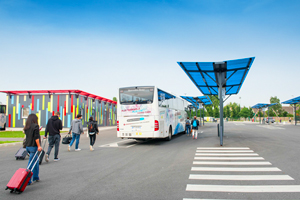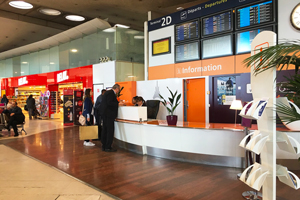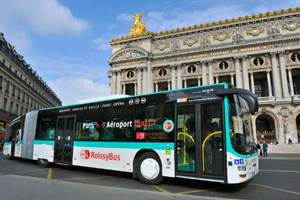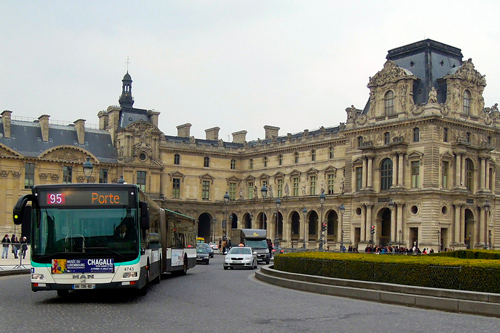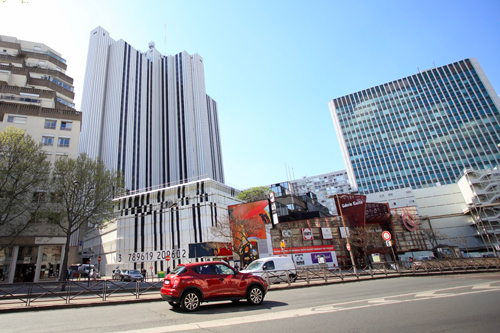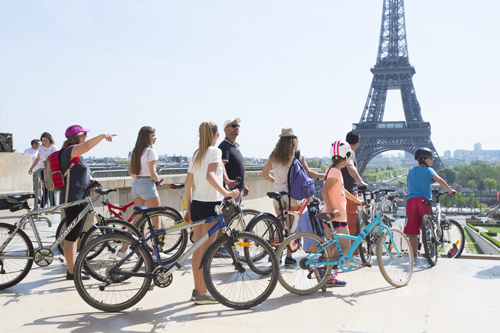Paris Transports
Paris Transports
Discover the best ways to get around Paris and enjoy a fantastic holiday
All transport in the city and the Paris suburbs is run by RATP Régie Autonome des Transports Parisiens). This is probably one of the most efficient transport systems in the world. Its extensive network connects the city with a stop every 500 metres and passengers can enjoy the convenience of a single ticket that is valid for all the different means of transport: buses, night buses (noctiliens), trams, the Metro and RER.
From our point of view, the cheapest way to get around quickly from one attraction to another is undoubtedly on the metro but, because this service runs undeground, it does mean you won't get a chance to admire any views of the city. So, the transport systems that will afford you the best panoramic views of the French capital and is probably the most enjoyable is a tourist bus. Naturally, on a double-decker bus, you will be able to enjoy lovely views of the city with the option to hop on and hop off whenever and wherever you want at one of the numerous stops that have been carefully planned to accommodate the huge number of tourists who visit the city each year.
Day-time and night-time city transport systems
Metro and the RER
The Metro has 14 city lines which are differentiated from each other by colour. The RER has 5 lines with connections across the city and into the outskirts and the different lines are distinguished from each other by different letters of the alphabet. You will find RER stops in the centre of the city as well, at the Eiffel Tower for example, but generally one of the fast train services is the logical choice for those who are intending to travel outside the capital. For further information, have a look at our article: Paris Metro & RER.
Buses and night-buses (Noctiliens)
The bus routes are numbered and at almost all the stops, you will be able to check a map of the different routes. The stops are optional so don't forget that you will need to let the driver know when you want to get off. There is a red button in the middle of the bus, you will need to press this in order to tell the driver where you want to stop. If you have forgotten to buy your tickets in advance, you can buy them on board but, they will only be valid for one journey.
The Noctiliens are the night service buses: 47 active lines which pick up when the day-time buses and the metro have finished(from 00:30 until approximately 05:30). Thanks to the Noctiliens, the night-time closure of the metro doesn't become a major drama so there is effectively a public transport system in operation 24 hours a day. For further information, have a look at our article: how to get around Paris by bus.
Getting around by car
For those who decide to hire a car in Paris, you will need to bear in mind that the traffic in Paris is extremely busy,particularly around the Grand-Boulevards and the Périphériques (in other words, the city's main connecting arteries). Parking bays are marked with a payment sign on the pavements and in the case of underground car parks, with a letter "P"in white against a blue background. Keeping within the lines that are painted on the road is really important as well as familiarising yourself with parking rules in general, in fact, a lot of the parking bays do have time restrictions which you must abide by, If you want to see a map of paid parking locations, have a look here: Parkingsdeparis.com.
Getting around by bicycle
For all lovers of freedom and fresh air, we can suggest hiring a bicycle at one of the numerous Velib' stations in the capital. For more information about this service, have a look at our article: Paris by Bicycle.
Private Taxis and Public Taxis
What is the difference between a private and a public taxi? One of the most significant differences is in the price. The former is a private service at a fixed cost which can be booked for airport transfers to a hotel, Disneyland Paris or any other destination which the client may require. However, the public taxis, whilst being very useful for getting around the city, are part of the Parisian taxi service which has an hourly rate. Especially at night, when perhaps once is more conscious of wanting to travel safely, we would recommend booking a public taxi whereas we would not recommend this service for airport transfers because the drivers can often make the journeys longer in order to increase the price above what it should be. In order to check out the map of Paris taxis and further information, have a look at our article: Public Taxis. In order to find out more about the efficient and competitively priced private taxi service (with more than 10 years experience in the sector), have a look at this page: Paris Airports Private Taxi.
PUBLIC TRANSPORT SCHEDULES PARIS
- The metro operates between 05:30 and 01:15 at night from Sunday to Thursday.At the weekends, (Fridays and Saturdays) and on days prior to a public holiday, the service is increased by one hour until 02:15 in the morning;
- The RER fast trains have a similar timetable to the metro, in other words, they operate between 05:30 and approximately 01:20 in the morning but there is no extension to the service hours at the weekends.
- When the metro and the RER stop working, the night buses known as Noctiliens come into serviceand are in operation from 12.30 at night until approximately 05:30 in the morning.
- The Paris taxis work 24 hours a day and our recommendation is to down-load the App in order to be able to easily book the nearest taxi to where you are.
- With regard to the public airport buses: theRoissybus, which connects Paris to Charles de Gaulle Airport (which is also known as Roissy), is operative from 05:00 to approximately 00:30; theOrlybus which is for connections to the airport of the same name, is a service that is in operation between 05:35 until around midnight. If your flight doesn't coincide with these schedules or the stops are too far away, it is also possible to book a private taxi at a fixed price.
PUBLIC TRANSPORT PRICES IN PARIS
The unique management system that operates the Parisian public transport system (RATP) means that you only need one ticket for the metro, the RER and the bus. In order to use the public transport service, the metro stations and information points for tourists also dispense single tickets as well as passes and cards. The price will vary depending on the zones selected but for most tourists who just want to visit the most important areas in the centre of Paris, it is usually sufficient just to buy tickets that cover Zone A.
- Single ticket (Zone A) costs €1.90;
- A T10 Pass (Zone A) costs €14.90, in other words, €1.49 per journey;
- A T20 Pass (Zone A) costs €28.00, in other words, €1.40 per journey.
The Carnets (Passes) are not user specific so you can easily share the tickets with a group of friends or family members with whom you are travelling.


